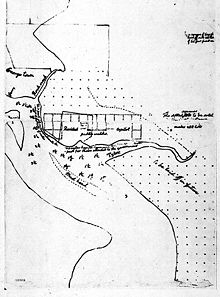Residence Act
- Residence Act
-
Le Residence Act of 1790, officiellement nommé An Act for establishing the temporary and permanent seat of the Government of the United States, est une loi du gouvernement des États-Unis qui met fin à la question de la localisation de la capitale des États-Unis. Le lieu retenu par la loi longe la rivière Potomac[1].
Notes et références
- ↑ Hélène Trocmé, « Washington, capitale : la puissance et la gloire », dans Le Monde de Clio, octobre 2000 [texte intégral (page consultée le 21 janvier 2011)]
Liens externes
Wikimedia Foundation.
2010.
Contenu soumis à la licence CC-BY-SA. Source : Article Residence Act de Wikipédia en français (auteurs)
Regardez d'autres dictionnaires:
Residence Act — Skizze von Washington, D.C. von Thomas Jefferson (März 1791) Der Residence Act of 1790, offiziell An Act for Establishing the Temporary and Permanent Seat of the Government of the United States, ist ein US amerikanisches Bundesgesetz, das die… … Deutsch Wikipedia
Residence Act — The Residence Act of 1790, officially titled An Act for Establishing the Temporary and Permanent Seat of the Government of the United States, is a United States federal law that designated Philadelphia, Pennsylvania as the temporary capital city… … Wikipedia
Residence in English family law — Residence is a term used to refer to not always similar concepts in various parts of English law including taxation, immigration, and family law. The remainder of this article deals exclusively with English family law. See residence in English… … Wikipedia
residence — res·i·dence / re zə dəns/ n 1: the act or fact of living in a place 2 a: the place where one actually lives as distinguished from a domicile or place of temporary sojourn a person can have more than one residence but only one domicile ◇ A… … Law dictionary
Residence — Res i*dence (r?z ? dens), n. [F. r[ e]sidence. See {Resident}.] 1. The act or fact of residing, abiding, or dwelling in a place for some continuance of time; as, the residence of an American in France or Italy for a year. [1913 Webster] The… … The Collaborative International Dictionary of English
Act of Free Choice — (Indonesian: Penentuan Pendapat Rakyat, PEPERA) was the title of an Indonesian military presentation in 1969 to establish an Indonesian claim that the Melanesian population of Western New Guinea had chosen Indonesian rule and rejected… … Wikipedia
residence — [rez′i dəns, rez′idens΄] n. [ME < MFr < ML residentia] 1. the act or fact of residing 2. the fact or status of living or staying in a place while working, going to school, carrying out official duties, etc., esp. long enough to qualify for… … English World dictionary
residence — /rez i deuhns/, n. 1. the place, esp. the house, in which a person lives or resides; dwelling place; home: Their residence is in New York City. 2. a structure serving as a dwelling or home, esp. one of large proportion and superior quality: They… … Universalium
Act of settlement — Settlement Set tle*ment, n. 1. The act of setting, or the state of being settled. Specifically: [1913 Webster] (a) Establishment in life, in business, condition, etc.; ordination or installation as pastor. [1913 Webster] Every man living has a… … The Collaborative International Dictionary of English
residence — A term of dual meaning, sometimes meaning a temporary, permanent, or transient character of abode; at other times meaning one s fixed abode or domicil. 25 Am J2d Dom § 4. Sometimes a mere physical presence in a place; at other times an abiding in … Ballentine's law dictionary
 Esquisse de Washington, D.C. par Thomas Jefferson (Mars 1791).
Esquisse de Washington, D.C. par Thomas Jefferson (Mars 1791).
